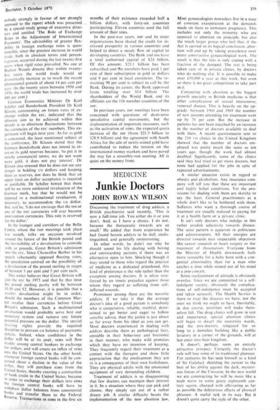MEDICINE
Junkie Doctors
JOHN ROWAN WILSON
Discussing the treatment of drug addicts, a British psychiatrist said recently, 'This is now a full-time job. You either do it or you don't. And, as I have a choice, I do not, because the therapeutic rewards are so small.' He added that from experience he had found heroin addicts to be dull, undis- tinguished, and generally uninteresting.
In other words, he didn't see why he should spend his life dealing with boring and unrewarding patients if there was an alternative open to him. Shocking though it may sound to those who regard the practice of medicine as a dedicated priesthood, this kind of preference is the rule rather than the exception among doctors. It is often rein- forced by an innate prejudice against those whom they regard as suffering from self- inflicted wounds.
Prominent among these are the narcotic addicts. If we take it that the average doctor's idea of a good patient is somebody who is cooperative, reliable, truthful, deter- mined to get better and eager to follow sensible advice, then the junkie is just about as far away from his ideal as you can get. Most doctors experienced in dealing with addicts describe them as pathological liars, unstable in their behaviour and histrionic in their manner, who make wild promises which they have no intention of keeping. They frequently regard their treatment as a contest with the therapist and show little appreciation that the predicament they are in is a consequence of their own foolishness. They are physical adults with the emotional equipment of very demanding children.
Treatment of addicts is so disappointing that few doctors can maintain their interest in it. In a situation where they can pick and choose, they simply opt out of a rather dreary job. A similar difficulty besets the implementation of the new abortion law.
Most gynaecologists nowadays live in a state of constant exasperation at the demands made on them to terminate pregnancy. This includes not only the minority who are opposed to abortion on principle, but also the much larger group who feel that, lithe Act is carried to its logical conclusion, abor- tion will end up by taking precedence over more constructive gynaecological work. The result is that the NHS is only coping with a fraction of the demand. The rest is being taken care of in private clinics, by doctors who do nothing else. It is possible to make over 00,000 a year at this work, but even so there is no great competition to take part in it.
Competing with abortion as the biggest growth specialty in British medicine is that other complication of sexual intercourse, venereal disease. This is heavily on the up- grade; between 1960 and 1969 the number of new patients attending for treatment went up by 78 per cent. But the increase in patients has not been matched by an increase in the number of doctors available to deal with them. A recent questionnaire sent to the 210 vp clinics in the United Kingdom showed that the number of doctors em: ployed was pretty much the same as ten years ago, though the work had almost doubled. Significantly, some of the clinics said they had tried to get more doctors, but none had applied for the jobs in spite of repeated advertisements.
A similar situation exists in regard to obesity and alcoholism. Any insurance com- pany will tell you that these are important and highly lethal conditions. Yet the pro- visions for dealing with them are sketchy to say the least. General practitioners as a whole don't like to be bothered with them. Sufferers who want a thorough course of treatment are usually reduced to paying for it at a health farm or a private clinic.
It isn't only doctors who indulge in this rather prudish selectivity towards disease. The same pattern is apparent in politicians and administrators. All their energies are directed towards nice respectable objectives like cancer research or heart surgery or the treatment of rheumatism. Everyone from the Minister of Health downwards feels more sympathy for a baby born with a con- genital abnormality than for a man who catches a dose while stoned out of his mind at a pop concert.
Some readjustment of attitude is obviously overdue. Since we are committed to a self- indulgent society, obviously the complica- tions of self-indulgence must be accepted and taken seriously. The Health Service is there to treat the diseases we have, not the ones we think we ought to have. Inevitably, in due course, priorities will make them- selves felt. The drug clinics will grow in size and importance. special abortion clinics will begin to dwarf the maternity wards, and the pox-doctors. relegated for so long to a nameless building like a public lavatory in a corner of the grounds, will at last enter into their kingdom.
It doesn't, perhaps. seem an entirely attractive prospect. Certainly the doctor's role will lose some of its traditional glamour. For centuries he has seen himself as a kind of Sir Galahad, shielding the patient to the best of his ability against the dark, mysteri- ous forces of the Universe. In the new world we are constructing he will be more like a male nurse to some gouty eighteenth cen- tury squire, charged with alleviating as far as possible the deleterious effects of physical pleasure. A useful task in its way. But it doesn't quite carry the style of the other.






































 Previous page
Previous page